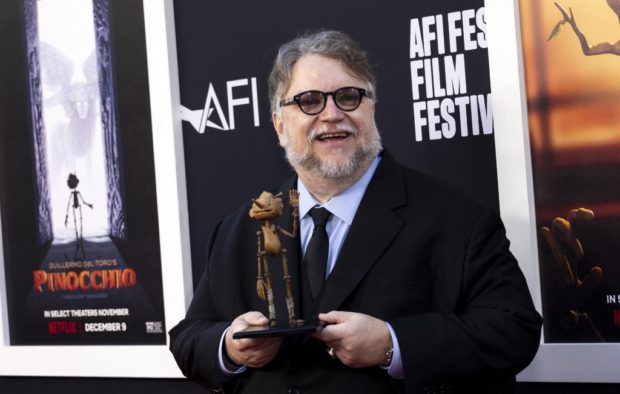Del Toro explores fascism and puppets in dark animated ‘Pinocchio’

(FILES) In this file photo taken on November 05, 2022, Mexican director Guillermo del Toro holds a wooden puppet as he arrives for the premiere of “Pinocchio” during the 2022 American Film Institute Festival at the TCL Chinese Theatre in Hollywood, California. (Photo by AUDE GUERRUCCI / AFP)
LOS ANGELES, United States — When Guillermo del Toro first set out to make a dark, animated version of “Pinocchio” 15 years ago, he opted to set his tale of puppets and their string-pulling masters in 1930s fascist Italy.
The characters of elderly woodcarver Geppetto and his exuberant living puppet Pinocchio were first created in an 1883 Italian novel, and later popularized by Disney.
But in “Guillermo del Toro’s Pinocchio,” out on Netflix next month, they find themselves living in Benito Mussolini’s inter-war world of military salutes, strict conformity and violent machismo.
“I wanted (to set the film in) a moment in which behaving like a puppet was a good thing,” del Toro told AFP on the red carpet of this weekend’s AFI Fest in Hollywood.
“I wanted Pinocchio to be disobedient,” he added.
“I wanted Pinocchio, who was the only puppet, to not act like a puppet. I thought, thematically, that was perfect.”
While the theme of fascism could appear timely in light of recent global politics, del Toro said the movie was just as relevant when he conceived the project years ago.
Indeed, del Toro has previously used his distinctive Gothic fairy tales to tackle the specter of fascism with films such as “Pan’s Labyrinth” and “The Devil’s Backbone,” both set in Franco-era Spain.
“It is something that concerns me because it’s something that humanity seems to come back to,” he said.
“I’ve always seen it. I don’t know if it’s the color of my glasses, but I always see it.”
Fascism is “always alive in the background — or in the foreground,” he said.
‘Kaleidoscopic’
The Oscar-winning Mexican director pitched his version of “Pinocchio” to Hollywood studios and producers for years before streaming giant Netflix finally bought the rights in 2018.
“I’ve been fighting to make it for half my career,” said del Toro.
The movie required over 1,000 days of filming.
It uses the painstaking method of stop-motion animation, in which puppets are carefully manipulated frame-by-frame to create the illusion of movement.
For del Toro, using computer-generated imagery — like Disney’s own recent live-action remake of its previous, seminal 1940 animation — was never an option.
“It was very pertinent for me to make a story about a puppet with puppets, and the puppets believe they are not puppets,” he said.
“It is a very beautiful sort of kaleidoscopic, telescoping thing.”
While del Toro has long been fascinated by animation, he won his Oscars for best director and best picture with 2017’s live-action “The Shape of Water,” and “Pinocchio” marks his first animated feature film.
“In North America, animation is seen as a genre for kids a little more,” said del Toro.
“One of the things that I think everybody is trying to change, not just us, is to say, ‘Animation is film, animation is acting, animation is art.'”
Stop-motion animation can “touch upon profoundly moving, profoundly spiritual things,” but it is “a practice that is constantly on the verge of extinction,” he said.
“It’s only kept alive by crazy fanatics… we keep it alive!”
Mother’s legacy
While the story explores father-son bonds, Del Toro became fascinated with the character of Pinocchio as a child when he was introduced to the mischievous marionette by his mother, with whom he was extremely close.
“I’d collect artifacts from Pinocchio… My mother and I saw it together when I was very young, and she kept giving me Pinocchios all through my life,” he recalled.
She passed away last month — just one day before the film’s world premiere in London. Del Toro told the audience there that they were about to watch “a film that bonded me with my mom for an entire life.”
“Guillermo del Toro’s Pinocchio” will be released on Netflix globally from December 9. The film’s cast of voice actors includes Ewan McGregor, Cate Blanchett, John Turturro and Tilda Swinton.